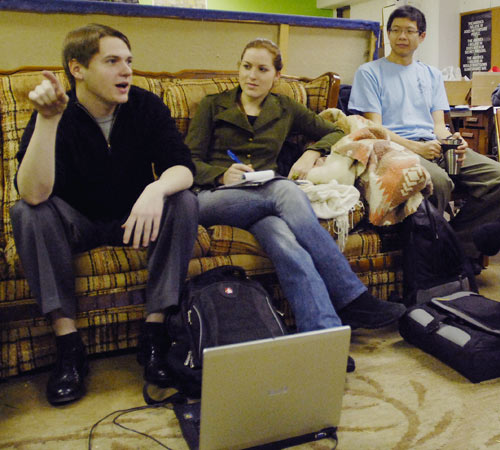Students, University continues to pursue wind turbine project

Daniel Weber, a candidate for the student senate, talks to the gathering of environmental groups at the YMCA on Wednesday. Brennan Caughron
January 29, 2009
After the postponement of the University’s wind turbine project at the end of the fall semester, student environmental activists have marked the first week back with several steps to revive it.
“The University spent $500,000 on the administrative costs of approving the local construction of three wind turbines,” said Suhail Barot, graduate student and chair of the Student Sustainability Committee. “Then they decided to abort the project,” he said.
“We’re obviously not happy about it – that’s why we organized a protest,” he added. “(The wind turbine project) has been the centerpiece of the campus sustainability movement.”
University officials have cited the looming cuts from state funding as the main reason for the postponement, and Office of Sustainability director Dick Warner said the University administration was very clear to point out that the project was postponed, not canceled.
“Since break, there have been quiet conversations with our funding partners about renegotiating the price,” he said.
Get The Daily Illini in your inbox!
“This week, the Student Sustainability Committee raised its contribution from $300,000 to $500,000 towards the $4.5 million dollar total cost to build the turbines,” Barot said. The committee is responsible for allocating the student clean energy fee, $2 per student per semester, for various sustainability innovations.
Anthony Larson, junior in ACES and vice president of Students for Environmental Concerns said several environmental student groups also organized a letter writing campaign. Nearly 150 letters were sent out in an effort to draw support from the
University administrators and faculty.
In the letters, leaders of environmental student groups said building the wind turbines will empower the University to maintain leadership in sustainability and provide a living learning laboratory.
“There’s a lot of money being spent on energy efficiency, but energy efficiency can’t create any energy,” said Barot. “From that standpoint, we need the renewables.”
Barot said the University should take advantage of the Student Sustainability Committee’s contribution increase and GE’s willingness to offer a substantial discount.
The GE contact for this project was not available to comment.
Warner added that he thinks the University administration understands students want the project to happen.
“(The University) feels a real dilemma,” he said. “They’re anticipating that jobs are going to be lost or student scholarships are going to be lost.”
“Many projects besides sustainability developments will be postponed due to financial concerns,” Warner said. “However,” he said, “the project is far from buried.”
“Modifying prices or the scope of the project are some of the solutions being discussed in ongoing conversations among funding partners,” he said.
Despite the financial crunch, Warner said he is confident in the project’s eventual success.
“Each of the funding partners is expressing clear interest in making this project happen.”






